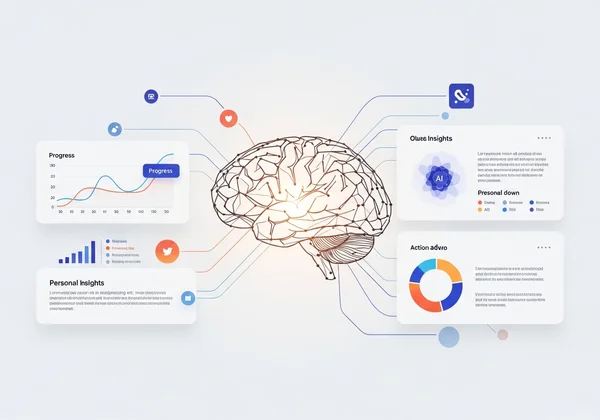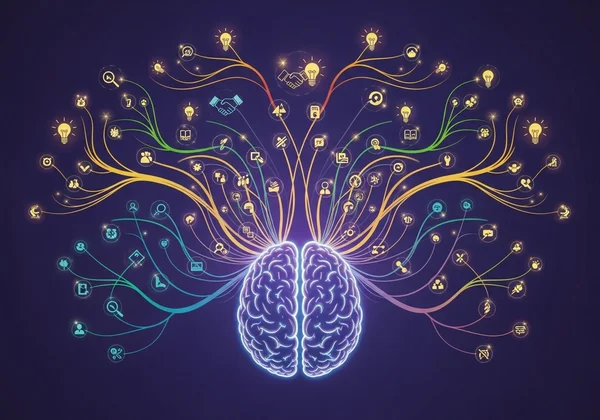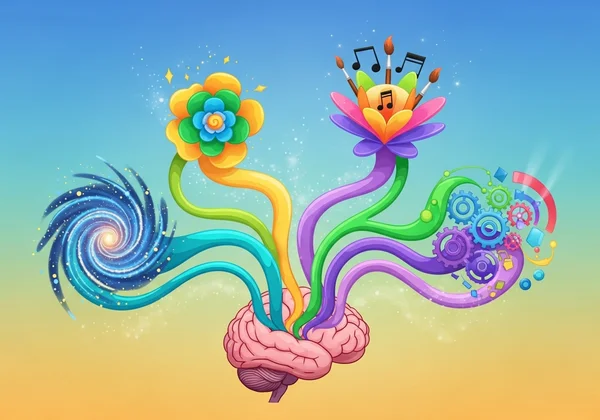RAADS-R: Beyond the Score with Your Personalized AI Report
September 15, 2025 | By Elara Vance
Unlocking Your Unique Story: Beyond the Score
Taking a self-assessment can feel like a significant step on a journey of self-discovery. You’ve answered the questions, received a score, and now you’re holding a piece of data. But a score is just a number; it isn't your story. The true value lies in understanding what that number means within the unique context of your life. This is where the power of the RAADS-R test's AI report comes into play. What is the AI personalized report that stems from the RAADS-R test, and how can it transform a simple screening into a profound tool for self-understanding?
If you've ever felt that standard results don't capture the full picture of your experiences, you're not alone. The journey toward understanding ourselves, especially concerning neurodivergent traits, is deeply personal. Our innovative AI report is designed to honor that individuality by moving beyond generalized scores. It provides a narrative woven from your specific answers and personal background, offering clarity and actionable insights. Ready to see what's beyond the score? You can start your assessment today.

Deciphering Your Personalized Autism Insights from the AI Report
Your AI-powered report from the RAADS-R test is more than a summary; it's a detailed map of your unique neurological landscape. Unlike a standard result, which provides a numerical snapshot, these personalized autism insights offer a qualitative exploration of your traits. The goal is to translate the data from the autism screening into a language that reflects your lived reality, empowering you with a deeper sense of self-awareness.
This section will guide you through interpreting the information your report contains. We’ll explore how to break down its components and, most importantly, how to connect its findings to your daily life. Think of it not as a label, but as a lens through which you can view your past experiences with more clarity and navigate your future with greater confidence.
Understanding Each Section of Your AI Analysis
Your personalized AI report is carefully structured to give you a holistic view. It typically breaks down the assessment into the core areas explored by the RAADS-R test framework, but with an added layer of contextual analysis. You might find sections dedicated to Social Relatedness, Language and Communication, Sensory/Motor Experiences, and Circumscribed Interests.
Instead of just showing a score for each, the AI analysis explains how your responses form a pattern. For instance, in the Social Relatedness section, it might highlight not just the degree of your social differences, but connect them to background information you provided, such as challenges in the workplace or a preference for one-on-one interactions. This detailed breakdown helps you move from "I scored high in this area" to "I understand why this area manifests in these specific ways in my life." This deeper level of interpreting results is the key to unlocking its power.
Connecting Traits to Your Real-Life Experiences and Context
This is the most powerful feature of the AI report. It bridges the gap between abstract traits and your concrete, everyday life. The AI algorithm synthesizes your test answers with the additional background information you provide—your personal strengths, challenges, and life situations. This process transforms a generic trait description into a meaningful personal narrative.
For example, a high score in Circumscribed Interests might be framed not just as having "narrow interests," but as a powerful ability for deep focus that could be a significant asset in your career or hobbies. If you mentioned struggling with burnout, the report might connect this to patterns of social masking or sensory overload identified in your responses. By seeing these connections laid out clearly, many users experience "aha" moments where lifelong patterns suddenly make sense. This personal context is what truly makes the report transformative, helping you see yourself and your experiences in a powerful new light.

Empowering Self-Advocacy: Using Your RAADS-R AI Report
Understanding yourself more deeply is the first step; the next is using that knowledge to improve your quality of life. The report from your RAADS-R test is a practical tool for self-advocacy autism, providing you with the language and confidence to articulate your needs to others. Self-advocacy is about knowing what you need and being able to ask for it, whether at home, at school, or at work.
This newfound clarity can be life-changing. Instead of feeling like you are simply "difficult" or "too sensitive," you can explain your needs from a place of understanding and fact. The report gives you a framework for these conversations, helping you build healthier relationships and create environments where you can thrive. Whether you are an adult seeking accommodations or a parent supporting your child, these insights are your first step toward effective advocacy. If you're ready to gain these insights, take the test.
Communicating Your Needs in Relationships and Social Settings
Relationships can be challenging when there's a misunderstanding of needs. Your report can illuminate why certain social situations are draining or why you communicate differently. For instance, if your AI analysis highlights sensory sensitivities, you can use this to explain to loved ones why you prefer quiet restaurants or need downtime after a party.
You can move from saying "I don't like crowds" to "Crowded places can cause me sensory overload, which is exhausting. Could we perhaps meet somewhere quieter?" This small shift in communication, backed by the insights from your report, is not demanding—it's explaining. It allows friends and family to understand the 'why' behind your preferences, fostering greater empathy and stronger, more supportive relationships.
Advocating in Professional and Educational Environments
The workplace and academic settings are often designed for a neurotypical majority, which can create invisible barriers for neurodivergent individuals. The AI report from your RAADS-R test can help you identify specific accommodations that would allow you to perform at your best. The analysis provides a solid foundation for requesting these changes.
For example, if the report identifies challenges with processing verbal instructions, you can confidently request that important tasks be communicated in writing. If it highlights a need for uninterrupted focus, you might discuss the possibility of using noise-canceling headphones or having designated quiet work periods. Presenting these needs with the backing of a detailed self-assessment report often lends them more weight and clarity, making it easier for managers and educators to provide the right support. You can start this journey by taking the free autism test.

Fostering Neurodivergent Growth Strategies with AI Assessment Application
True growth comes not from changing who you are, but from learning how to thrive as you are. The ultimate goal of the AI assessment application from the RAADS-R test is to help you develop personalized, neurodivergent growth strategies. This means shifting the focus from perceived deficits to unique strengths and building a life that honors your neurotype.
This approach is about creating sustainable well-being. It involves identifying potential triggers and building effective coping mechanisms, but it also—and perhaps more importantly—involves recognizing and leveraging your inherent talents. The AI report serves as a blueprint, guiding you toward strategies that work with your brain, not against it. It empowers you to build a more authentic and fulfilling life based on a compassionate understanding of yourself.
Developing Personalized Coping Mechanisms and Support Systems
Your AI report can act as an early warning system, helping you recognize patterns that may lead to stress or burnout. By understanding your specific sensory profile, social energy limits, and communication style, you can proactively develop coping mechanisms. This might mean scheduling sensory breaks throughout your workday, practicing scripts for difficult conversations, or finding hobbies that align with your natural interests.
Furthermore, the report can help you build better support systems. When you can clearly articulate your needs, you can find friends, family, or professionals who truly understand and support you. Whether it’s joining a community of other autistic adults or finding a therapist who specializes in neurodiversity, this self-knowledge is the foundation for creating a network that uplifts and sustains you.
Harnessing Your Unique Strengths for Personal and Professional Success
For too long, the conversation around autism has focused on challenges. We believe it's time to change that. Your AI report is designed to help you identify and harness your unique strengths. That intense focus? It’s a superpower in fields that require deep expertise. That unique way of looking at the world? It’s the source of incredible creativity and innovation.
The report can help you reframe your traits as assets. Perhaps your systematic thinking makes you an excellent programmer, or your keen eye for detail makes you a talented artist or editor. By understanding your cognitive profile, you can seek out educational paths, careers, and personal projects where your natural abilities can shine. This strengths-based approach is fundamental to building not just a life of coping, but a life of success and joy. You can explore your traits and discover your strengths with our tool.

Your Journey Forward: Embracing Deeper Understanding & Action
This unique RAADS-R AI Report offers more than just a screening result; it's a personalized key to deeper self-understanding and a practical guide for empowerment. It helps you move from questioning your experiences to understanding them, from confusion to clarity, and from self-doubt to self-advocacy. It transforms abstract data into a personal story, giving you the language to describe your inner world and the tools to shape your outer one.
Your path to self-discovery is unique and ongoing, and this report is designed to be a trusted companion. Let these insights be your foundation for building a life that truly resonates with who you are. Ready to unlock this profound self-awareness? Visit our homepage and get your personalized report today.
FAQ Section: Frequently Asked Questions About Your RAADS-R AI Report
How do I interpret my RAADS-R AI personalized report effectively?
To interpret your report effectively, start by reading it through once to get a general impression. Then, revisit each section, paying close attention to the connections the AI makes between your test responses and your personal background. Reflect on specific examples from your own life that align with the insights provided. The goal is not to look for a diagnosis, but to use the report as a tool for self-reflection and to identify patterns that resonate with your lived experience.
What makes the RAADS-R AI report more personalized than standard results?
Standard results from a basic RAADS-R test might provide a numerical score based solely on your answers to the test questions. The RAADS-R AI report goes a crucial step further by integrating your responses with the additional contextual information you provide about your life, challenges, and strengths. This allows the AI to generate a qualitative, narrative-based analysis that explains how and why your traits may manifest in your unique situation, offering far deeper and more actionable insights.
Can the RAADS-R AI report provide a formal autism diagnosis?
No, absolutely not. It is critical to understand that the RAADS-R AI report, and the RAADS-R test itself, are screening and self-reflection tools, not diagnostic instruments. A formal diagnosis of autism spectrum disorder can only be made by a qualified healthcare professional through a comprehensive clinical evaluation. Our tool is designed to be an informational starting point for self-exploration or to help you organize your thoughts before seeking a professional opinion.
Where can I find additional resources for self-advocacy after reading my report?
Your report is a great first step. For further resources, consider looking into established autism and neurodiversity advocacy organizations online, such as the Autistic Self Advocacy Network (ASAN). You can also search for online communities and forums where autistic adults share experiences and strategies. Starting your journey with a clear understanding of your own traits, which you can get from our online tool, will help you find the resources that are most relevant to you.